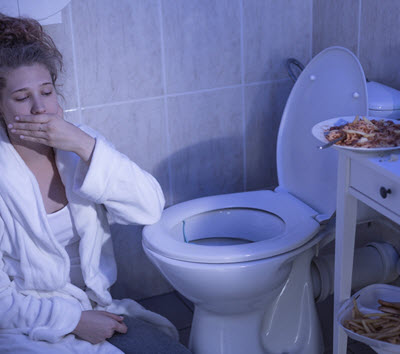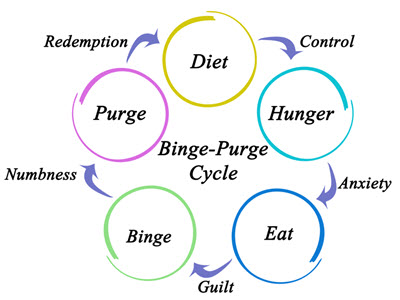 An unrelenting urge…
An unrelenting urge…
Courtney*, a junior in college, was panicking over not being able to privately throw up her latest 2-hour binge in the community bathroom in her dorm. Several students were in there applying makeup for a night out.
The idea of not getting rid of all the food and calories was terrorizing. Alone in her dorm room, her eyes searched frantically for an answer. And there it was.
An empty shoe box.
Most people battling bulimia cannot understand why they cannot resist the binge/purge cycle.
In the beginning, you feel in control… until you don’t. And loved ones may start to catch on.
“Why are you doing this to yourself… to the body I gave you?” a frustrated mother cries.
“Why don’t you just stop?” a frustrated brother asks for the 100th time.
 Bulimia Nervosa is serious.
Bulimia Nervosa is serious.
Bulimia is addictive.
Bulimia involves strong, intense cravings to binge, followed by an even more intense yearning to purge. The rush of relief after purging becomes addictive.
These behaviors are not ‘crazy.’ Indeed, they are quite telling. They are wonderful messengers (yes, I said wonderful because they are waiting to tell their stories in order to move into healing) of what needs your attention.
The behaviors can be used as bright spotlights on what emotions are being ignored. On what pain is being stuffed with food. On what feelings need identified in the purging behavior.
 Treatment is complex and takes effort, patience, compassion, and time.
Treatment is complex and takes effort, patience, compassion, and time.
It also involves a cheering squad consisting of a specific mix of the following providers and support groups pertinent to the severity of your condition:
Specialized individual therapy; weekly or bi-weekly: A strong therapeutic alliance is a good predictor of a positive outcome. Hold on to this: the sooner you enter treatment in your disorder, the better your outcome. 80% who enter treatment DO recover. *
Family therapy: 20+ years ago, families were blamed, especially moms. Today, we know families are an integral part of the healing process.
Non-diet Dieticians: No dieting allowed! But understanding the role of nutritional wellness as your body heals is important, and working with a dietician trained in eating disorders is very useful.
Psychotropic intervention: Fancy way to say medication but appropriate to consider when other disorders are occurring such as anxiety, depression, bi-polar disorder, OCD.
12-Step groups: I often will go with you to your first meeting.
Intensive Outpatient Programs: For many reasons unique to each person, weekly sessions may not be the right level of care just yet. Eating disorders are serious and legitimate conditions that deserve appropriate levels of care to match your current stage. We’ll discuss this if it appears weekly sessions are not yet providing the recovery you deserve.
Inpatient treatment: This understandably strikes fear and resistance in most people’s hearts. I get it. We’ll talk about it if your condition appears to be worsening instead of improving. You will have options, and I won’t spring this option on you ‘out of the blue.’
Our primary focus in treatment is developing (FINALLY!) a true sense of Self ‘beyond the mirror’….
… challenging “food rules,” learning intuitive eating skills, finding and using healthy coping skills, creating genuine Self-Care, and of course addressing long-standing core issues about yourself.
We will work to allow you to see that you are more than just your body; and you are valuable, loved, and cherished as you are now!
Let’s honor and respect the hidden pain you are on and recognize your eating disorder behaviors are really an attempt to feel better.
Let’s pay attention to the tension! Admit it, food and purging worked in the beginning. That’s ok!
Let’s not shame yourself any longer.
Instead, let’s understand the behaviors.
And as soon as you are willing to accept this radical idea without judgment, we can untangle the depths of shame and pain hiding within your eating disorder.
As you think it over, get curious! If your vomit had words, what would it say to you? Call me. Let’s talk about it: (713) 269-3972.

